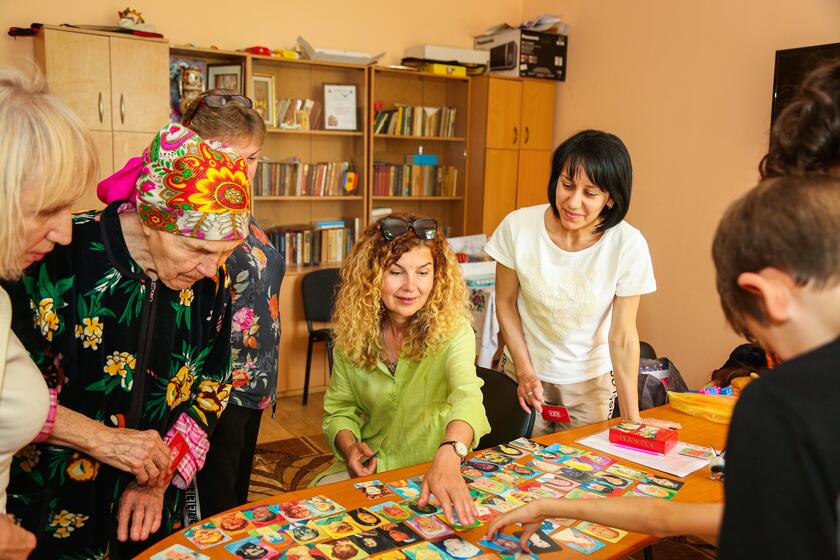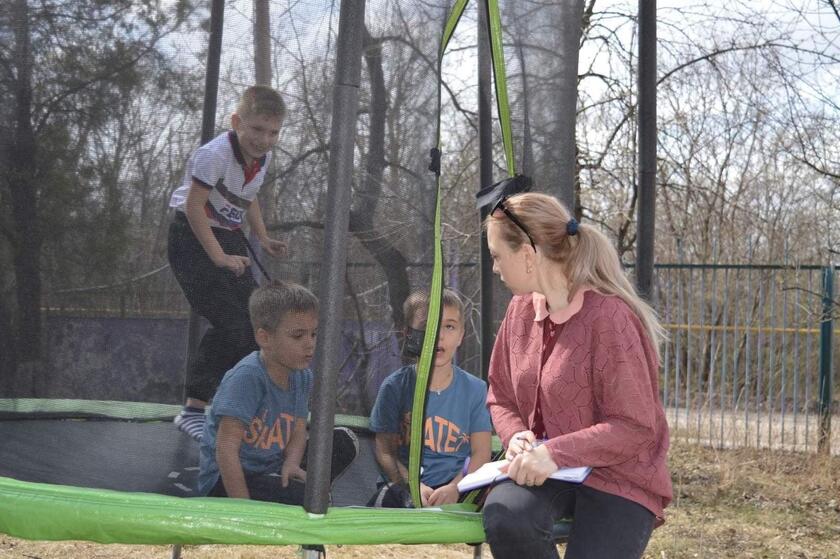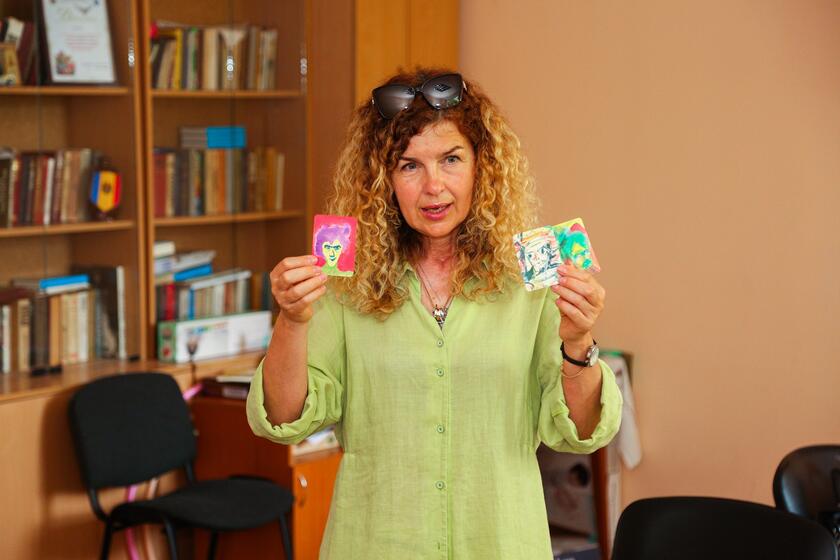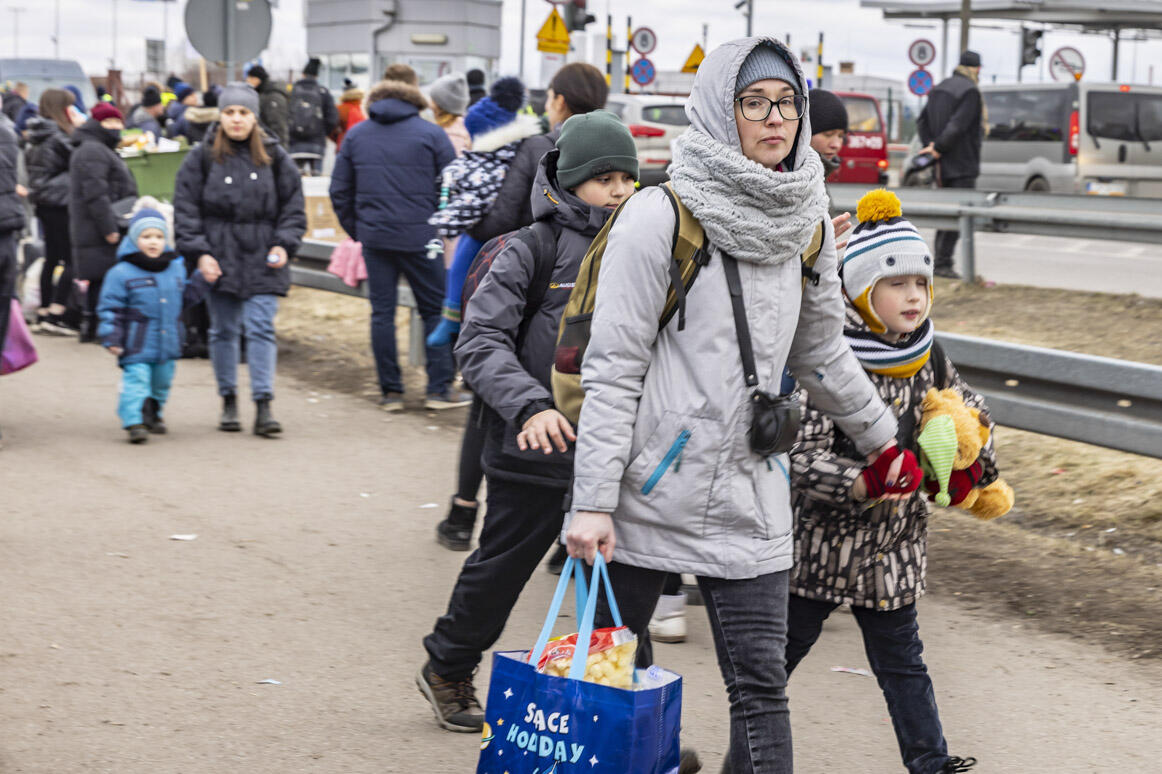"Being near and showing empathy: That is often enough initially."
This is the story of Victoria Novicova, a Ukrainian from Zaporizhzhya. After fleeing, she decided to use her professional experience as a psychologist to support refugees in the Republic of Moldova. Victoria is part of the mobile psychologist team of the organisation CASMED, which is supported by Johanniter International Assistance.
“I am a human being, a daughter, a mother, a grandmother, a friend, a psychotherapist, and also a Ukrainian – unfortunately, only lately did I start to feel proud of this latter part. My life has been pretty successful: I have a job that I love, my clients, a grown-up son and even a grandson. I even started to travel a while ago. Until February 24.
At 5 a.m., my son called me and said: “Wake up, we’re being fired at; there’s a war on”. It’s taking over me as I’m writing about it now, and I feel tears coming up. But at that time I got up quickly and started to pile up stuff like a robot: documents, jewelry, and some cash. When that was done, I sat down with no idea of what to do next. My son called again and said, “Mom, come to us. I guess you and Dasha and Eric (my daughter-in-law and my grandson) will have to leave”. I didn’t try to question where we’d be going.
I found a scotch tape and started to cross tape the windows. I don’t even remember where I got this idea from. Then I dressed up and left with a single backpack.
Escape from the explosions

I spent a week with my children, and every time we heard the alert we obediently climbed down the basement, even in the middle of the night. The boy became moody and even developed a nervous tic. About a week later we decided to leave. Funny, we didn’t even have a plan of where to go, we just wanted to evade the town. Again, it happened all of a sudden, after one night: in the morning we fueled up, took two more fuel cans and just took the road towards Dnieper. I didn’t feel anything – I guess it was my way of coping. But everything was bubbling inside me and I had an unpleasant sinking feeling in my stomach, the one that you get before an exam, almost like nausea.
We went past Dnieper and Kryvyi Rih in one go, but much further the traffic got heavy. My biggest fear was to run out of fuel and get stuck somewhere on the road in the middle of the night with the kid in the car. I drove non-stop to cover about 500 km, until Umani. That took us 24 hours, including 10 hours – the whole night, in fact – to overcome the last 25 km to Umani. We only stopped for a couple of hours to have a nap by the road, next to other cars and, as it turned out, next to a graveyard.
We didn’t discuss where we were going, but I had Poland in mind. So, when we heard explosions before us, in Vinnitsa, I panicked. I felt trapped: there was no way forward and no going back. Besides, after a 3-hour line at the fuel station we could only get 20 liters, and that’s nothing. The alert sound in Umani was the last straw for me: I wept, feeling absolutely helpless.
In the morning we decided to go for the nearest border, which was Mohyliv-Podilskyi. Making this decision made it easier for us. It took us another sleepless night to cross the border. Having slept over in a monastery in Otaci, we set off towards Chisinau and Balti. In Balti we were lucky to be received at Dumbrava Alba, and that was a true bliss: the end of our journey, a room, hot water and even food. We felt completely satisfied.
Help for fellow Ukrainians

In just a week, having got my rest, I started to look for a job: once you get such support, it’s important to begin to support others, to feel involved even when you’re far from home. The employment agency offered me a few job options as a psychologist, and that’s how I ended up at CASMED.
My first encounters with people from Ukraine were very worrying: I didn’t know whether they would want my compassion, my sympathy and understanding. As a psychologist I knew it took readiness and a certain amount of trust. It helped that I was one of them – we were all in the same boat. It was emotionally challenging at first. Even now it’s hard to hold back my tears when I hear some people: I guess, my sympathy for them mixes with my own experience. But then you feel accomplishment, especially when you see people unfreeze inside and start to live their feelings instead of suppressing them. Naturally, at first they’re scared to face these feelings. But when they know they’re not alone, when they have someone who’s ready to be by their side and not stop them, but just be sympathetic, it becomes easier for them. People mostly relaxed and engaged at once, and their trust was worth a lot. They could share their worries with someone who felt the same, someone who was also afraid for their loved ones and their home, who also felt helpless and desperate at times.
A girl called me today on my way to work. It was Tatiana, and at first I couldn’t even remember how I knew her. She was really happy and grateful and gave me a hug. She’s here with two kids. Her father who stayed in Odessa died recently, and she couldn’t even go to his funeral. When we met a few days ago, she was in a miserable state: she couldn’t dare tell her kids that their grandpa was gone and wouldn’t allow herself to mourn him because she didn’t want to scare them. I talked to her about how and when to do it. So, now she told me she did it, and it was a huge relief: they mourned together, side by side – her kids and her, and they supported each other. And it was a happy moment for me as well as for them.
I’m a Gestalt and Family Constellations therapist capable of using various therapy tools, but I realize that the most important thing is just being near and showing empathy. Often, this alone is enough at first.
The story was translated by our partner CASMED and made available to us. Thanks for that!

